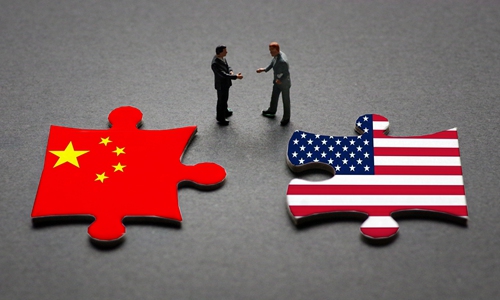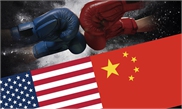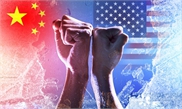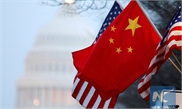
Photo: IC
Since the novel coronavirus raged, China-US relations have continued to decline. The successive China-related policies and bills introduced by the US government and the US Congress have seriously damaged bilateral relations. The US officials are also increasingly vocal in their attacks on China. Some commentators in both the US and China noted that bilateral relations are in "free fall." World public opinion is worried that once China-US relations get out of control, it will be more difficult for the global economy to recover in the post-COVID-19 era. Arms races and geopolitical conflicts will surely intensify, the world order will become more chaotic, and some unexpected disasters will be on the way. This is by no means alarmist.
The more difficult China-US relations become, the more we need to establish the bottom line thinking.
Around 2014, Chinese officials repeatedly stated: Strategic mutual trust, economic and trade cooperation and people-to-people and cultural exchanges are the three pillars underpinning the China-US relationship. Based on this, I believe there are three bottom lines that should be upheld in today's China-US relations.
The first bottom line is that no matter how serious the differences between the two countries may be, they must be handled by peaceful means instead of resorting to war. It is unrealistic at this stage to expect China and the US to build genuine strategic mutual trust, but at the very least each side should convince the other side that it would never take the initiative to provoke a war. War here includes not only nuclear war and conventional war, but also unconventional war such as cyber war and space war. There is no denying that the Chinese and US militaries are preparing for war, and in recent years each has made the other the main imaginary enemy. This trend will continue for a long time to come. Fortunately, the militaries of China and the US have maintained close contacts even in the face of poor political communications.
In August 2017, the military command systems of both sides signed the Joint Staff Dialogue Mechanism. This document plays an important role in crisis management between the two militaries. To avoid war, the US must honor its commitment to what it refers to as "one-China" policy and must not support "Taiwan independence."
The two countries should work together with other relevant countries to achieve demilitarization of the South China Sea and maintain peace and stability on the Korean Peninsula.
The second bottom line is to maintain a certain scale of economic and trade cooperation and maintain financial stability. Due to the trade war launched by the US against China and other political reasons, bilateral trade volume and two-way investment have declined in the past two years, and the decoupling of cooperation in the field of high technology has become a reality. In the foreseeable future, it is unrealistic to expect economic and trade cooperation to become the anchor and propeller of bilateral relations. However, a complete decoupling of bilateral economic relations and technical cooperation is not in the interest of any party. The key strategic question is in what areas and to what extent can and must economic and trade cooperation be maintained?
As we note, the China-US phrase one trade deal reached on January 15 is still under implementation. It may be difficult to fully implement the agreement due to COVID-19 and other reasons, but the principled consensus reached by the two sides in the agreement should be maintained. Take soybean for example, China's market gap is very large, as more than 80 percent of the soybean needs to be imported. If the US soybean farmers are willing to produce and sell at a reasonable price, why not buy large quantities of US soybeans in accordance with the phase one trade agreement?
The other reality that I have to admit is, without the cooperation of the US technology companies like GE, China's large commercial aircraft will operate much later. If China does not buy Boeing aircraft from the US, no other aircraft manufacturer, including Europe's Airbus, can fill the gap in the Chinese aviation market. China already has about 600 Boeing aircraft, which also need technical maintenance such as spare parts. Therefore, the bottom line of China-US cooperation in aviation is unbreakable. For the US, it is also a huge commercial resource that it will never give up.
If iPhones could no longer be bought and used in China due to the deterioration of China-US relations, it would be beyond the bottom line for the users. Similarly, Walmart stores, Marriott Hotels, KFC, McDonald's and Starbucks in the Chinese mainland are all US brands operated by Chinese merchants. Maintaining these brand effects and learning from the laws and rules of the market economy are important ways for China's economic reform. A few US politicians want US companies to divest from China and reduce bilateral trade. We should do the opposite. In recent years, China has taken many measures to open up its economy and encourage foreign investment in China. It is a blow against these American politicians, not a compromise to them.
In the high-tech field, the US government has made every effort to crack down on Chinese companies such as Huawei in the name of national security. Huawei has fought back against US government sanctions by working with US companies and other overseas companies. Huawei's more than 30 US suppliers have been negotiating with the Congress and the US government since last year in an effort to ease sanctions against the company. Huawei insists on multichannel communications with mainstream US media, enterprises, government departments, and judiciary departments, and uses legal methods to handle disputes. As long as Chinese companies stick to the principle of linking up with their US counterparts and strive to take a bigger place in the global industrial chain, Huawei and other Chinese companies will surely survive.
In the field of international finance, China certainly does not want to see the US dollar occupying a hegemonic position forever. It should be noted that it is necessary for China to hold a certain amount of US Treasury bonds for a long time, and China will also respect the status of the US dollar as the world's main reserve currency for a long time. Some days ago, it was said that in order to punish China's behavior in the fight against the COVID-19 pandemic, the US may default by canceling China's purchase of Treasury bonds directly or refusing to pay interest on the bonds. When the news came to light, it immediately stirred up heated debates. Such a violation of the bottom line of international financial rules would cause irreparable financial and credibility losses to the US.
The third bottom line is to resolutely safeguard people-to-people and social exchanges between China and the US. After more than 20 years of retirement, the first Chinese-American ambassador, Ms Julia Chang Bloch, has devoted herself to the cause of people-to-people and educational exchanges. Last March, she wrote in the Global Times that "through the ups and downs of China-US relations, both countries have reached a consensus that the bonds forged by thousands of students across the Pacific Ocean should not be jeopardized."
The US government is considering banning or restricting Chinese citizens from studying in the US on the grounds of national security. This would be a short-sighted decision deviating from the US international education tradition and foreign policy. In Chang Bloch's view, humanitarian exchanges are now the last pillar of China-US relations and must not be dismantled again.
According to the US census data, the Chinese-American population in the US exceeds 5 million, of which 2.2 million were born in China. In 2017, 3.2 million Chinese tourists went to the US and they spent $35 billion in total that year on travel- and tourism-related goods and services. A total of 2.3 million American tourists set foot in China in 2017 alone. Forcibly preventing population movements and cultural exchanges between China and the US through political means not only brings huge economic and cultural losses to the two countries, but also violates humanism and personal freedom.
The development of China-US relations is currently facing huge obstacles and the possibility of retrograde. This difficult situation may last for a year or two, or for a decade or two, and we need to be fully prepared. However, no matter what happens, the huge material foundation, spiritual wealth and human resources accumulated since the establishment of diplomatic ties 41 years ago will not be destroyed in an instant. The deep exchanges and cooperation between China and the US are driven by strong internal forces in both societies, which is a major feature of China-US relations. Bilateral relations should not be dominated by the US, and China must and can do a lot.
We can see that those born in the 1990s and the 2000s who want to study and communicate in each other's countries are among those who place their hopes on cooperation between China and the US. It also includes over 1 million middle-aged Chinese-born entrepreneurs and intellectuals in the US, and millions of people in our two countries and around the world who can benefit from our cooperation. Many senior diplomats and social elites in the two countries are still working hard to stabilize bilateral relations.
It is only a matter of time and opportunity for China-US relations to return to the normal track as long as the above three bottom lines are upheld and the overall breakdown of bilateral exchanges is stopped. In July 1989, with the bilateral relations facing serious setbacks, Deng Xiaoping insisted unswervingly that "China-US relations will eventually be better." In November 2017, President Xi Jinping stated in a meeting with President Trump: "With perseverance, we can surely write a new chapter in the history of China-US relations. With perseverance, our two great nations will definitely make new contribution to creating a better future for mankind."
The author is a professor at School of International Studies, Peking University. opinion@globaltimes.com.cn



